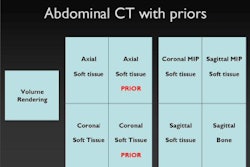I was chatting with a friend the other day about the parallels and paradoxes among PACS, marriage, and kids, and the more we talked, the funnier the discussion became. Marriage and PACS are inversely proportional -- from 1970-2002 marriages declined 22% (from 72% to 59%) while PACS has grown at about that rate from the mid-1990s until now.
About 10% of the population is divorced; just about that many hospitals that currently have PACS have elected to get rid of their systems but have not selected a new one yet. Forty-seven percent of first marriages end in divorce. Just about that many hospitals choose different vendors the second time around as well.
My favorite parallel is that the odds of the Green Bay Packers winning the Super Bowl, the New York Mets winning the World Series, or a woman having twins at any age is about equal to the odds of an affair evolving into a lifelong committed relationship. Sometimes vendors feel that same way when a PACS decision drags on ad infinitum.
OK, so where is this going? Entering into a marriage is a very serious commitment, and for most who elect to go into it, it's considered a lifelong commitment. PACS also is a very serious commitment, and for many it can be a career-defining one as well.
Yet nearly half of the marriages and half of all PACS implementations today result in divorce, in large part because neither party knew what to expect. What's fascinating is that you can prepare for both PACS and marriage in so many ways, yet few people avail themselves of the tools to ensure that the marriage or the PACS work. Since many of the myths related to marriage are the same as the myths related to PACS, let's examine them more closely.
It's a 50/50 proposition
The vendor will do everything for you sometimes, and you will do everything for you sometimes. If you luck out, it averages out somewhere around 50/50, but realistically, you will probably end up pulling much more than your own weight to make the PACS work as you want it to work.
Even if you have a service agreement, the amount of work you will do is inversely proportional to the amount you initially thought you would have to put into it. It also takes a lot more than just having a PACS administrator onsite to support a system. It takes IT support, network support, and a lot more to make the system work. Figure on giving 100% 24/7, with anything provided by the other party a bonus.
Two people in a good marriage will grow closer over time
Sometimes this is true in PACS, but since 50% of all PACS relationships end in divorce even the best PACS can be replaced by another. A good marriage is about constant care and nurturing; a good PACS requires the same.
If you think about it, this myth goes against what we know about achieving anything good in life. If you want to be physically fit, just having a gym membership won't make it happen. A healthy body takes constant attention and work.
The same is true for healthy relationships; clients and vendors need to work together. That said, if the client chooses a different replacement vendor, it doesn't mean that the vendor relationship wasn't good, but rather that it may be time to find another who better meets your needs.
Another marriage myth -- that there is only one person in the word for us -- holds true here. Unlike marriage, a PACS is usually ready to be traded in after about five years, while marriages that end in divorce typically almost make it to the eight-year mark. The good news though is that 65% of all marriages make it until their 10th year and 52% to their 15th so....
When couples argue, the relationship is destroyed
I have yet to see a vendor/client relationship in which everything went perfect or even anywhere near perfect. I've also yet to see the perfect marriage or anything resembling that either. That doesn't say it doesn't exist, but even in the best marriages disagreements occur. It's how you work through them that matters most.
This also piggybacks on another myth -- if a couple loves each other, they won't have problems -- because PACS networks WILL have problems, and many problems at that, just as relationships will have problems. It's about understanding the source of the problems and finding a solution that meets both people's needs.
It's also about having realistic expectations for one another. If you feel disappointed, maybe your expectations were unrealistic to begin with. Does that mean change your expectations or lower your standards? Nope. But sitting down and agreeing on expectations early on can overcome many disappointments. That is the purpose of having a strong PACS project manager, although realistically the expectations should be set way before the vows have been said so the "I dos" don't become the "I thoughts."
Everyone should be married
For years I've used the rule of thirds: one-third of people who want PACS and need PACS are ready for PACS, one-third of the people who want PACS and need PACS aren't ready for PACS yet and require everything from identifying who the PACS administrator is to computer room upgrades to network upgrades on down, and one-third of the people who want PACS want PACS to solve problems that PACS can't solve.
It's like that other myth -- having a baby will bring a couple closer together and increase marital happiness. If anything, having a baby will exacerbate the problem, not make it better. Many times process changes are what are needed, not PACS, yet only someone who has seen the problems before can help the couple through.
Having money will solve all problems
The best PACS isn't the one that costs the most or the least, but that is the right one for you. Total cost of ownership (TCO) is much more important than initial purchase price. Cost is such a small part of the overall equation that it barely breaks the top 10.
Spouses should be able to read each other's minds
If the system doesn't perform like you expect it to or service isn't good, the vendor won't know unless you say something and say it loudly. Conversely, if the system is understaffed or isn't getting the attention it needs from the hospital, it is the vendor's responsibility to say so as well.
I recall one posting in the PACS Digital Community Forum on AuntMinnie.com in which the vendor got blasted by the hospital (and deservedly so). What you didn't hear, though, was that the client software wasn't upgraded as suggested, the hardware being used was designed for 20% of the volume currently being put through it, and items of a similar ilk.
Why then didn't the vendor cry loud and long? Their answer was "Well, we told them but ... they ignored us." So why let it continue as they got lambasted? Because they didn't want to rock the boat and be too pushy. Oh puhleease....
The keys to long-term marriage are good luck and romance
Certainly good luck and a lil' romance won't hurt in either relationship, PACS or marriage, but it takes a lot more -- communication, commitment, shared values, attitude, and most importantly, the ability to forgive (critically important in a both a relationship and in PACS) -- to make it work.
A person's family background has no effect on the marriage
The band The Who may have made the song "Won't Get Fooled Again" popular, but most hospitals bring at least some baggage to their next PACS decision. What I find fascinating, though, is that Albert Einstein's famous definition of insanity -- "Doing the same thing over and over again and expecting different results" -- defines many folks' principal strategy for avoiding future problems.
We've all seen people who marry someone just like their first spouse, then wonder why it went wrong the second time around. At the very least, perform your own "due diligence" and make your decision, but before signing a contract (or saying "I do"), have an objective third party provide input to you so you don't make the same mistake twice (or at least give yourself the best chance of making the "project" a success, be it PACS or marriage).
Pursuing your own needs is incompatible with making the marriage work
Vendors would love to have you buy every clinical system under the sun from them. This is the crux behind the integrated versus interfaced story that is so prominent in the integrated RIS/PACS arena.
The reality is sometimes the things you need most come from outside the marriage (and I'm not talking about having an affair, either). While the vendor might have what it feels is the perfect radiology information system (RIS) or voice recognition (VR) system, there may be and often are better solutions that meet your needs out there.
Just as a good marriage is bigger than what each partner brings into it, both partners sometimes have to maintain a certain amount of separateness as well. Interfaces can overcome almost any barrier and allow you to have the best of all worlds, building a stronger relationship with each vendor while meeting the needs of the hospital as well.
The more educated a woman is, the lower her chances of getting married
Another myth that has gone by the wayside is the idea that women who are more educated are less likely to get married. The more educated clients are about the PACS they are buying, the better decisions they usually will make. This includes developing a full team of individuals from your facility: radiology, IT, techs, administration, purchasing, etc.
Unfortunately, there are very few places one can go to get an unbiased "PACS education," despite the plethora of vendor "educational seminars" being offered that are nothing more than thinly veiled sales pitches.
Couples who live together before marriage have more satisfying and longer-lasting marriages than couples who do not
Just as it has been shown statistically that couples who live together before marriage have a higher chance of breaking up, so too do clients have a greater chance of "breaking up" with vendors the longer you use their systems for "free."
One vendor used to give a 90-day "free trial" of their system, then backed it down to 60 days, and then to 30 days. Why? Well, the longer people used the system, the more opportunity they had to identify items they didn't like or items they liked in a competing system better.
Shorten the demo time and the objections become minimized. One thing that is also rarely talked about is how these "free trials" help close deals. Any PACS is better than no PACS, and while not taking anything away from these vendors, it's nearly impossible to remove a system that helps your overall productivity however much or little it does. This does contradict the myth about cohabitation being like marriage but without the paper because a commitment of sorts is made, although personal autonomy is factored in here.
The individual who championed the system being installed might look bad if the system were pulled, so more often than not the system stayed even if it wasn't the best choice. This may not be right, but it is reality.
The parallels between PACS and marriage are many because all require work and commitment, commitments made and reaffirmed on a daily basis. It takes a 100% commitment to make it work 100% of the time, and one person just can't do it alone.
Vendors and clients both need to approach a PACS purchase like a marriage, giving and taking, compromising, and looking at this as a long-term relationship. Only then will you achieve the comfort level that comes from knowing you hopefully made the right decision.
By Michael J. Cannavo
AuntMinnie.com contributing writer
August 15, 2006
Michael J. Cannavo is a leading PACS consultant and has authored nearly 300 articles on PACS technology in the past 15 years. He can be reached via e-mail at [email protected].
The comments and observations expressed herein do not necessarily reflect the opinions of AuntMinnie.com, nor should they be construed as an endorsement or admonishment of any particular vendor, analyst, industry consultant, or consulting group. Rather, they should be taken as the personal observations of a guy who has, by his own account, been in this industry way too long.
Related Reading
Part XI: Exploring PACS Secrets -- Stop the insanity, May 29, 2006
Part X: Exploring PACS Secrets -- Excuses, excuses, May 19, 2006
Part IX: Exploring PACS Secrets -- How to fix DICOM, April 20, 2006
Part VIII: Exploring PACS Secrets: It's broke -- Fix it, April 6, 2006
The 2005 PACSman Awards: This PACS is your PACS, this PACS is my PACS, November 30, 2005
Copyright © 2006 AuntMinnie.com



















